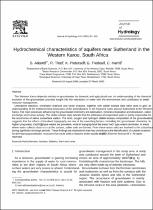 ResearchSpace
ResearchSpace
Hydrochemical characteristics of aquifers near Sutherland in the Western Karoo, South Africa
JavaScript is disabled for your browser. Some features of this site may not work without it.
- ResearchSpace
- →
- Research Publications/Outputs
- →
- Journal Articles
- →
- View Item
| dc.contributor.author |
Adams, S

|
en_US |
| dc.contributor.author |
Titus, R

|
en_US |
| dc.contributor.author |
Pietersen, K

|
en_US |
| dc.contributor.author |
Tredoux, G

|
en_US |
| dc.contributor.author |
Harris, C

|
en_US |
| dc.date.accessioned | 2007-01-11T11:39:28Z | en_US |
| dc.date.accessioned | 2007-06-07T10:04:00Z | |
| dc.date.available | 2007-01-11T11:39:28Z | en_US |
| dc.date.available | 2007-06-07T10:04:00Z | |
| dc.date.copyright | en_US | |
| dc.date.issued | 2001-01-15 | en_US |
| dc.identifier.citation | Adams, S. et al. 2001. Hydrochemical characteristics of aquifiers near Sutherland in the Western Karoo, South Africa. Journal of hydrology, vol 241, 2 Jan, pp 91-103 | en_US |
| dc.identifier.issn | 0022-1694 | en_US |
| dc.identifier.uri | http://hdl.handle.net/10204/1377 | en_US |
| dc.identifier.uri | http://hdl.handle.net/10204/1377 | |
| dc.description.abstract | The Western Karoo depends entirely on groundwater for domestic and agricultural use. An understanding of the chemical evolution of the groundwater provides insight into the interaction of water with the environment and contributes to better resource management. Descriptive statistics, correlation matrices and factor analysis, together with stable isotope data were used to gain an understanding of the hydrochemical processes of the groundwaters in the fractured rocks around Sutherland in the Western Karoo. The main processes influencing the groundwater chemistry are salinisation, mineral precipitation and dissolution, cation exchange and human activity. The stable isotope data indicate that the infiltration of evaporated water is partly responsible for the occurrence of saline subsurface waters. The ionic, oxygen and hydrogen stable isotope composition of the groundwaters suggests that the effects of localised topography are one of the overriding factors controlling the groundwater chemistry. In higher lying areas, Ca(HCO3)(2) type waters are prevalent, while in topographical flat areas NaCl type waters dominate. In areas where water collects close to or at the surface, saline soils are formed. From these areas salts are leached to the subsurface, during significant recharge periods. These findings are important in that they contribute to the identification of suitable locations for developing groundwater resources that could yield relatively better quality water. | en_US |
| dc.format.extent | 340276 bytes | en_US |
| dc.format.mimetype | application/pdf | en_US |
| dc.language.iso | en | en_US |
| dc.publisher | Elsevier Science | en_US |
| dc.rights | Copyright: 2001 Elsevier Science | en_US |
| dc.source | en_US | |
| dc.subject | Hydrochemistry | en_US |
| dc.subject | Isotopes | en_US |
| dc.subject | Semi-arid zones | en_US |
| dc.subject | Water resources | en_US |
| dc.subject | Civil engineering | en_US |
| dc.subject | Geosciences | en_US |
| dc.title | Hydrochemical characteristics of aquifers near Sutherland in the Western Karoo, South Africa | en_US |
| dc.type | Article | en_US |
| dc.identifier.apacitation | Adams, S., Titus, R., Pietersen, K., Tredoux, G., & Harris, C. (2001). Hydrochemical characteristics of aquifers near Sutherland in the Western Karoo, South Africa. http://hdl.handle.net/10204/1377 | en_ZA |
| dc.identifier.chicagocitation | Adams, S, R Titus, K Pietersen, G Tredoux, and C Harris "Hydrochemical characteristics of aquifers near Sutherland in the Western Karoo, South Africa." (2001) http://hdl.handle.net/10204/1377 | en_ZA |
| dc.identifier.vancouvercitation | Adams S, Titus R, Pietersen K, Tredoux G, Harris C. Hydrochemical characteristics of aquifers near Sutherland in the Western Karoo, South Africa. 2001; http://hdl.handle.net/10204/1377. | en_ZA |
| dc.identifier.ris | TY - Article AU - Adams, S AU - Titus, R AU - Pietersen, K AU - Tredoux, G AU - Harris, C AB - The Western Karoo depends entirely on groundwater for domestic and agricultural use. An understanding of the chemical evolution of the groundwater provides insight into the interaction of water with the environment and contributes to better resource management. Descriptive statistics, correlation matrices and factor analysis, together with stable isotope data were used to gain an understanding of the hydrochemical processes of the groundwaters in the fractured rocks around Sutherland in the Western Karoo. The main processes influencing the groundwater chemistry are salinisation, mineral precipitation and dissolution, cation exchange and human activity. The stable isotope data indicate that the infiltration of evaporated water is partly responsible for the occurrence of saline subsurface waters. The ionic, oxygen and hydrogen stable isotope composition of the groundwaters suggests that the effects of localised topography are one of the overriding factors controlling the groundwater chemistry. In higher lying areas, Ca(HCO3)(2) type waters are prevalent, while in topographical flat areas NaCl type waters dominate. In areas where water collects close to or at the surface, saline soils are formed. From these areas salts are leached to the subsurface, during significant recharge periods. These findings are important in that they contribute to the identification of suitable locations for developing groundwater resources that could yield relatively better quality water. DA - 2001-01-15 DB - ResearchSpace DP - CSIR KW - Hydrochemistry KW - Isotopes KW - Semi-arid zones KW - Water resources KW - Civil engineering KW - Geosciences LK - https://researchspace.csir.co.za PY - 2001 SM - 0022-1694 T1 - Hydrochemical characteristics of aquifers near Sutherland in the Western Karoo, South Africa TI - Hydrochemical characteristics of aquifers near Sutherland in the Western Karoo, South Africa UR - http://hdl.handle.net/10204/1377 ER - | en_ZA |





